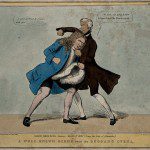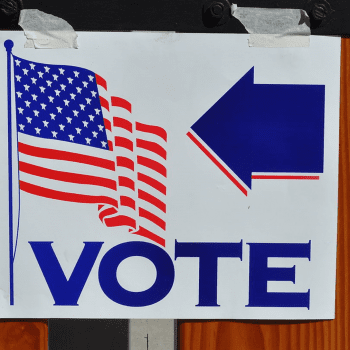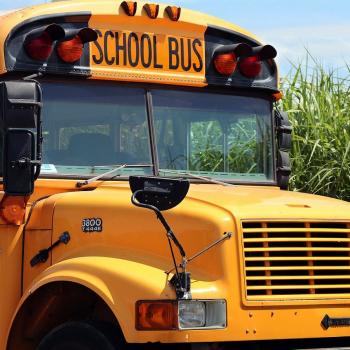![https://commons.wikimedia.org/wiki/File%3AHamiltontrumbull-crop.jpg; By John Trumbull [Public domain], via Wikimedia Commons](https://wp-media.patheos.com/blogs/sites/533/2016/11/Hamiltontrumbull-crop.jpg)
Why do we have such a convoluted mechanism as the Electoral College?
Here’s how Alexander Hamilton explains the purpose in number 68 of The Federalist Papers:
It was desirable that the sense of the people should operate in the choice of the person to whom so important a trust was to be confided. This end will be answered by committing the right of making it, not to any pre-established body, but to men chosen by the people for the special purpose, and at that particular conjuncture.
It was equally desirable that the immediate election should be made by men most capable of analyzing the qualities adapted to the station and acting under circumstances favorable to deliberation, and to a judicious combination of all the reasons and inducements which were proper to govern their choice. A small number of persons, selected by their fellow-citizens from the general mass, will be most likely to possess the information and discernment requisite to so complicated an investigation.
It was also peculiarly desirable to afford as little opportunity as possible for tumult and disorder. This evil was not least to be dreaded in the election of a magistrate who was to have so important an agency in the administration of the government as the President of the United States. But the precautions which have been so happily concerted in the system under consideration promise an effectual security against this mischief. The choice of several to form an intermediate body of electors will be much less apt to convulse the community with any extraordinary or violent movements than the choice of one who was himself to be the final object of the public wishes. And as the electors, chosen in each State, are to assemble and vote in the State in which they are chosen, this detached and divided situation will expose them much less to heats and ferments, which might be communicated from them to the people, than if they were all to be convened at one time, in one place.
It was thus perfectly natural: in the same way as one chose one’s representative, once chose one’s elector, and in the same way as the decision about all manner of subjects was delegated to that representative via his legislative powers, so, too, the decision of who should be president was delegated to the elector. Electors were expected to have much more information at hand about the possible contenders for the presidency, especially when convening within their states after the election, than the common man, and could deliberate in a more reasoned way than it was expected that an ordinary voter, hearing information second- or third-hand, would do. What’s more, the Founding Fathers had not intended for political parties to establish themselves; hence, the original provision that each elector had two votes, and the second-place finisher would be vice-president.
Was the notion of electors intended to play some role in ensuring that political influence was dispersed across the country rather than concentrated in more populous parts of the country? Not in the least. How else, after all, could the Founders have imagined electing the electors than via districts? And, even then, the actual mechanism of determining the electors was left to the states, and prior to the Civil War, in certain states, it was the state legislature, and not the people, who chose the electors. (Read more at, where else?, wikipedia, though I can’t find the statement that the state legislature sometimes chose the electors, so it must have been in some other pre-reading that I did.)
Besides which, at the time of the ratification of the constitution, it was further expected that each elector would vote as he chose; it was only somewhat later, after the election of 1824 (again, see wikipedia) that the standard practice came to be that electors voted together as a block on a winner-take-all basis.
Which means that our current practice, of statewide winner-take-all elections with electors pledged to candidates, is not at all in line with the Founders’ intentions. The idea of an intermediate group deliberating with care and away from the passions of the people is, in case you haven’t noticed, gone completely.
Now, that being said, are there arguments in favor of the current system, and reasons to keep it despite the occasional situation, as is likely this year (votes are still being counted), in which the Electoral College winner is the popular vote loser?
One claim is that the system forces candidates to campaign throughout the country rather than just in the largest cities. I don’t buy it. What it does, in practice, is advantage voters in “battleground” states, with a more-or-less even split between the parties/candidates, over those from states dominated by one part or the other — and I mean this not in the sense that candidates campaign in one locale and not the other, but in the fact that, in the winner-take-all system, once the candidate has the plurality of votes, any additional votes don’t contribute to an overall margin.
In any case, in a pure popular vote system, it’s hard to see candidates really sticking with just New York City and Los Angeles — these cities (which don’t vote 100% Democrat anyway) are not the only game in town, and, besides, the cost of air time for commercials in smaller cities makes them reasonable choices as well. Besides, even in the current system, the cities dominate the elections in their respective states, and any map of red and blue counties will show a very small number of very populous blue counties. What’s more, consider the 2000 election, the closest in recent history, nearly a tie: for the most part, split very regionally, as Al Gore took the Left Coast, the Northeast, and a patch of rust belt Great Lake states, and Bush took the south and midwest/Great Plains states.
Another claim is that the Electoral College system ensures that, if there were again a situation in which the election were as close as it was with Florida, it could be resolved with a statewide recount. Can you imagine, supporters say, the nightmare of a nationwide recount? But, of course, a nationwide recount is simply too improbable to consider a concern, once your looking at the sheer number of votes cast across the entire country.
So what’s the alternative?
As always, there’s a Jane Plan. Call it the Jane Plan for Presidential Election Reform. And, yes, we keep the electors. But we’ll give them a different role.
Here’s how it works:
First, the election is conducted as usual, with each person choosing the presidential ticket of their choice. Then, on a national basis, electors are allocated, based on the proportion of the vote that each candidate one, with rounding rules to handle fractional electors: the number of electors for top-finishing candidates are rounded up, and the number of electors for bottom-finishing candidates are rounded down, as needed to total the actual number of electors (which, since we’re revising things, can be an odd number to avoid the possibility of ties, and can be any arbitrary number, but should be a sizeable amount so that smaller finishers are more likely to have some electors rather than always round to 0).
Then, if any one candidate has a majority of electors, that individual is the winner of the election.
If no one candidate has a majority, then the electors of a smaller party can change their vote, in a manner similar to the concept of what would have happened had the Republican convention been contested.
In some cases, a minor party candidate might say from the start, “vote for me because I represent all your hopes and dreams, but if I do not get a plurality my electors will vote for X.” This would have been Jill Stein’s message, for instance: “my electors will cast their vote for Hillary if I receive fewer votes than she does.”
In other cases, a minor party candidate might attempt to use their votes as a bargaining chip, seeking cabinet positions, or policy commitments from the major party candidate who best represents their views. How far they push things would be limited by the continuing role of the House of Representatives; if they get greedy and unreasonable, and the process came to a stalemate, then the House would vote in the same manner as is currently prescribed. Consider the Jill Stein scenario: if she/her electors were the difference between a win and a loss for Clinton, but they pushed too hard, some electors from the Trump camp might offer to defect in return for binding promises to govern in a more middle-of-the-road way.
Why is this better than just adopting a winner-take-all method based on the popular vote? Because it makes no sense to complain about a Democratic candidate having a marginally larger vote tally than the Republican candidate, and thus having some kind of “moral right” to be President, if at the same time, a third-party candidate or candidates had significantly more votes than the delta between the two major party candidates. After all, at this point, per wikipedia’s totals, Clinton has about a 200,000 vote popular vote lead over Trump, but even upstart Evan McMullin has double this number of votes.
How would this actually play out? It’s not really possible to look at prior elections and work out their outcomes — more people in one-party-dominated states would vote, rather than feel their vote was lost, and more people, in general, would choose third party/independent candidates, knowing their vote would still be meaningful.
Image: https://commons.wikimedia.org/wiki/File%3AHamiltontrumbull-crop.jpg; By John Trumbull [Public domain], via Wikimedia Commons













